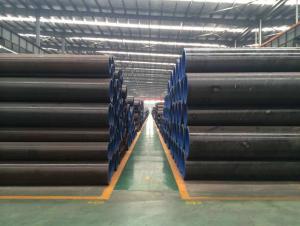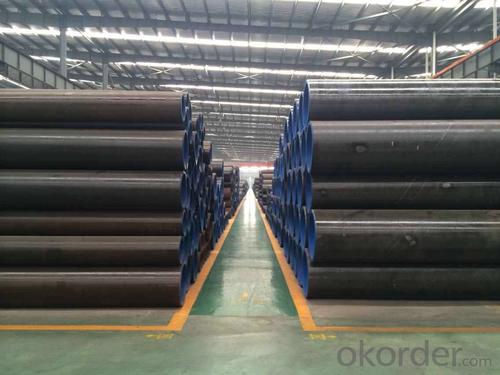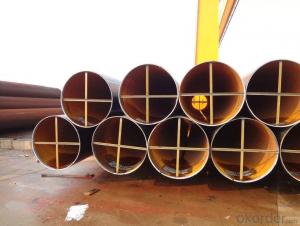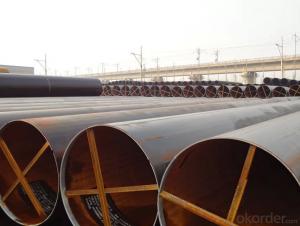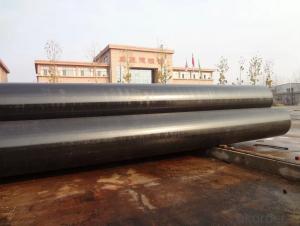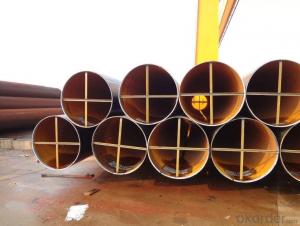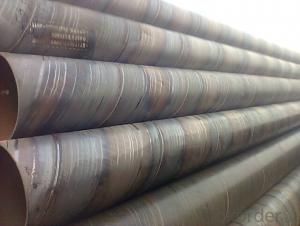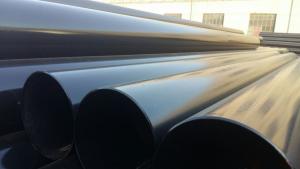Large diameter longitudinal submerged arc welded pipe materials
- Loading Port:
- Tianjin
- Payment Terms:
- TT or LC
- Min Order Qty:
- 28 m.t.
- Supply Capability:
- 9000 m.t./month
OKorder Service Pledge
OKorder Financial Service
You Might Also Like
Product Description:
1、Structure of Welded Steel Tube:
Welded Steel Tube is formed by drawing a solid billet over a piercing rod to create the hollow shell. We are company that have many years experience and professional manager team and engineer team and sales team, sure we will provide you high quality of welded pipe and professioanl service.
2、Main Features of the Welded Steel Tube:
• High manufacturing accuracy
• The higher strength
• The small inertia resistance
• Strong heat dissipation ability
• Good visual effect
• Satisfy price
3、Welded Steel Tube Specification:
Standard | GB, DIN, ASTM ASTM A106-2006, ASTM A53-2007 |
Grade | 10#-45#, 16Mn 10#, 20#, 45#, 16Mn |
Thickness | 8 - 33 mm |
Section Shape | Round |
Outer Diameter | 133 - 219 mm |
Place of Origin | Shandong, China (Mainland) |
Secondary Or Not | Non-secondary |
Application | Hydraulic Pipe |
Technique | Cold Drawn |
Certification | API |
Surface Treatment | factory state or painted black |
Special Pipe | API Pipe |
Alloy Or Not | Non-alloy |
Length | 5-12M |
Outer Diameter | 21.3-610mm |
Grade | 20#, 45#, Q345, API J55, API K55, API L80, API N80, API P110, A53B |
Standard | ASME, ASTM |
1) Material:20#(ASTM A 106/A53 GRB.API5LGRB,GB),45#,16Mn,10#.
2) Specification range:OD:21.3-610mm,WT:6-70mm,length:6-12m or according to the requirement of clients.
3) Excutive standards:GB,ASME API5L.ASTM A 106/A53,Despite of the above standards,we can also supply seamless steel pipe with standard of DIN,JIS,and so on,and also develop new products according to the requirements of our clients!
4) Surface:black lacquered,varnish coating or galvanized.
5) Ends:Beveled or square cut,plastic capped,painted.
6) Packing:bundles wrapped with strong steel strip,seaworthy packing.
4、Packaging & Delivery
Packaging Details: | seaworthy package,bundles wrapped with strong steel strip |
Delivery Detail: | 15-30days after received 30%TT |
5、FAQ of Welded Steel Tube:
①How is the quality of your products?
We have many years business experience in this area, and we have professional engineer and manager team and sure we can provide you high quality production and professional service.
②How about price?
If you like bargain and factory price is not low enough as you think, just don’t waste your time.Please trust the quotation we would give you, it is professional one.
③Why should you chose us?
We can give you both.Additionally, we can also offer professional products inquiry, products knowledge train(for agents), smooth goods delivery, exellent customer solution proposals.Our service formula: good quality+good price+good service=customer’s trust.
6、 Welded Steel Tube Images:
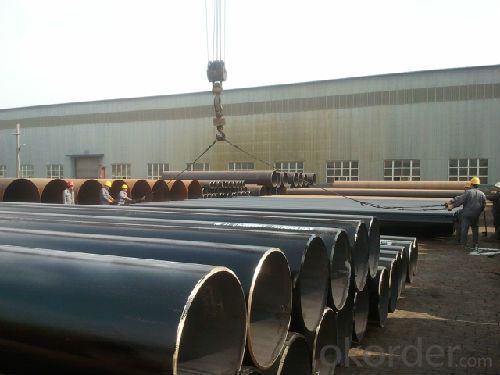
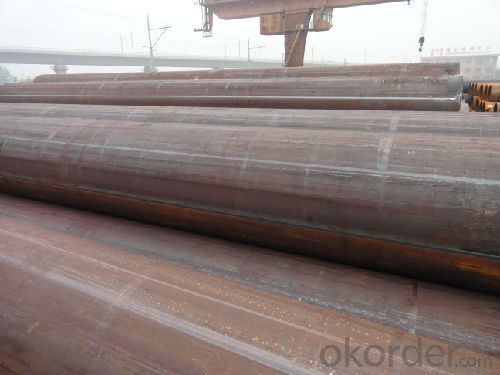
- Q: How are steel pipes used in the manufacturing of wastewater treatment systems?
- Steel pipes are commonly used in the manufacturing of wastewater treatment systems as they provide a durable and corrosion-resistant material for transporting and distributing water and chemicals within the system. They are used for various purposes such as conveying wastewater, carrying treated water to different stages of the treatment process, and transferring chemicals for disinfection or filtration. Additionally, steel pipes are often used for constructing the framework and support structures of wastewater treatment systems due to their strength and versatility.
- Q: How are steel pipes classified according to their wall thickness?
- Steel pipes are classified according to their wall thickness into various categories such as standard, extra strong, and double extra strong.
- Q: How are steel pipes tested for strength and durability?
- Steel pipes are tested for strength and durability through various methods, including destructive and non-destructive testing. Destructive testing involves subjecting the pipes to intense pressure or impact to determine their breaking point, while non-destructive testing methods, such as ultrasonic or magnetic particle testing, are used to detect any internal or surface defects that may compromise their strength and durability. These tests ensure that steel pipes meet the required standards and can withstand the intended usage conditions.
- Q: What are the different end types for steel pipes?
- There are several different end types for steel pipes, including plain ends, beveled ends, threaded ends, and grooved ends. Plain ends are smooth and do not have any special features. Beveled ends are cut at an angle to facilitate welding. Threaded ends have threads that allow for easy installation with other fittings. Grooved ends have grooves that enable quick and secure connections using couplings.
- Q: What are the different methods of protecting steel pipes from external damage?
- There are several methods of protecting steel pipes from external damage, including coating the pipes with a corrosion-resistant material such as epoxy or polyethylene, applying a layer of protective tape, installing a cathodic protection system, using concrete or rock shielding, and implementing measures to prevent soil movement or impact damage.
- Q: Can steel pipes be used for wastewater treatment?
- Indeed, wastewater treatment can make use of steel pipes. The construction of wastewater treatment plants and systems frequently incorporates steel pipes owing to their robustness, resilience, and resistance to corrosion. Their exceptional suitability lies in their capacity to handle the transportation and distribution of wastewater, given their ability to withstand substantial pressure and temperature fluctuations. Moreover, steel pipes have the potential to be coated or lined with materials that offer supplementary protection against corrosion and chemical reactions with the wastewater. Nonetheless, it is crucial to ensure the adequate upkeep, inspection, and replacement of steel pipes when required, to avert potential leaks or failures that could jeopardize the wastewater treatment process.
- Q: What is the role of steel pipes in the renewable energy sector?
- The transportation and distribution of various energy sources in the renewable energy sector heavily rely on steel pipes. An important application of steel pipes is seen in the construction of pipelines for transporting natural gas, which is increasingly being used as a cleaner alternative to traditional fossil fuels. Due to its strength, durability, and resistance to corrosion, steel is commonly chosen for these pipelines, ensuring the secure and efficient delivery of natural gas to power plants and other energy consumers. Furthermore, steel pipes are utilized in the installation of geothermal energy systems. Geothermal energy utilizes the heat from the earth's core to generate electricity or provide heating and cooling. Steel pipes are employed to create geothermal wells, allowing the extraction of hot water or steam from underground reservoirs. These pipes must withstand high temperatures and pressures, making steel an ideal material for this purpose. Additionally, hydraulic systems for hydroelectric power plants heavily rely on steel pipes. These power plants generate electricity using the force of flowing water, and steel pipes are used to convey water from the reservoir to the turbines. The durability and reliability of steel ensure the efficient transmission of water, enabling hydroelectric power plants to produce clean and renewable energy. In the construction of solar power plants, steel pipes also play a crucial role. Solar thermal systems concentrate sunlight to generate heat, which is then transferred to a fluid to produce steam and drive turbines. Steel pipes are essential for circulating and transferring this fluid, ensuring the effective operation of the solar power plant. In conclusion, steel pipes are indispensable in the renewable energy sector due to their strength, durability, and resistance to corrosion. They facilitate the transportation of natural gas, the extraction of geothermal energy, the transmission of water in hydroelectric power plants, and the circulation of fluids in solar power plants. By enabling the efficient distribution of various energy sources, steel pipes significantly contribute to the growth and sustainability of the renewable energy sector.
- Q: How can steel pipes be protected from corrosion?
- There are several methods available to protect steel pipes from corrosion. One commonly used method is the application of protective coatings, which create a barrier between the steel and the corrosive elements in the environment. Epoxy is the most widely used coating for steel pipes and offers excellent corrosion resistance. Depending on the specific requirements, polyethylene and polyurethane coatings can also be used. Another effective way to prevent corrosion is through cathodic protection. This technique involves using sacrificial anodes or impressed current systems. Sacrificial anodes, typically made of zinc or aluminum, are attached to the steel pipes and corrode instead of the steel, sacrificing themselves to protect the pipes. Impressed current systems utilize a direct electrical current to counteract the corrosion process. To ensure the longevity of steel pipes, regular maintenance and inspection are crucial. It is important to monitor the condition of the coatings and address any signs of damage or deterioration promptly. Additionally, implementing proper drainage systems to prevent the accumulation of moisture around the pipes is essential for corrosion prevention. Consideration of environmental factors is also necessary when protecting steel pipes from corrosion. This involves mitigating exposure to corrosive substances like acids or chemicals and ensuring adequate ventilation and airflow to prevent moisture and humidity buildup. By implementing a combination of these protective measures, steel pipes can have an extended lifespan and maintain their structural integrity.
- Q: How are steel pipes used in the mining industry?
- Steel pipes are widely used in the mining industry for various purposes such as transporting water, slurry, and other fluids, as well as for ventilation and structural support in underground mines. Their durability, resistance to corrosion, and high pressure capacity make them ideal for these applications.
- Q: Are steel pipes suitable for transporting chemicals?
- Yes, steel pipes are highly suitable for transporting chemicals. This is due to their excellent resistance to corrosion and high durability, ensuring the safe and efficient transportation of various chemicals over long distances.
Send your message to us
Large diameter longitudinal submerged arc welded pipe materials
- Loading Port:
- Tianjin
- Payment Terms:
- TT or LC
- Min Order Qty:
- 28 m.t.
- Supply Capability:
- 9000 m.t./month
OKorder Service Pledge
OKorder Financial Service
Similar products
Hot products
Hot Searches
Related keywords
